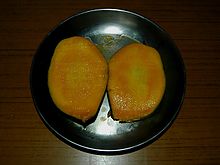The 'Alampur Baneshan' mango, sometimes spelled Banishan, is a named mango cultivar that originates from India.[1] In Southern India, it is sometimes known as Seeri. It differs from, but is related ancestrally to, the high-volume commercial cultivar Banganapalli. However, this is a much older and prized cultivar.[citation needed]
| Mangifera 'Alampur Baneshan' | |
|---|---|
 Unripe Alampur Beneshan mangoes | |
| Genus | Mangifera |
| Species | Mangifera indica |
| Cultivar | 'Alampur Baneshan' |
| Origin | India |


Description
editThe fruit is medium-sized with thin skin, ranging in color from green to yellow.[2] The flesh of the ripe fruit is fiberless, ranging in color from yellow to golden-yellow to orange-yellow. Many Indian strains stay green even on ripening, though a slight yellowing or blush is often noted near the stalk. The pores in the skin have a distinct whitish coloration. There is no distinct bouquet from the ripe fruit, but the flesh has a deep, slightly tart flavor with slight accents of cinnamon, pepper, jackfruit and other Indian mango cultivars like Alphonso.
See also
editReferences
edit- ^ Ray, P.K. (2002). Breeding Tropical and Subtropical Fruits. Springer. p. 19. ISBN 978-3540428558. Retrieved 3 October 2014.
- ^ Agricultural Research Center-West (U.S.). Northeastern Region; Agricultural Research Center (Beltsville, Md.); United States. Agricultural Research Service. Horticultural Crops Research Branch (1897). Plant inventory; plant material introduced. Washington, D.C.: United States Department of Agriculture. Retrieved 3 October 2014.